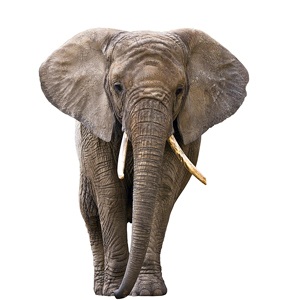
Online selling and weak controls on domestic ivory sales in Japan are spurring illegal international trade in elephant tusks and contributing to a steep rise in poaching, activists said.
A lack of rules regulating the registration of raw ivory and the licensing of importers, wholesalers, manufacturers and retailers has allowed illicit stocks into Japan's domestic market, according to the report by the independent London-based Environmental Investigation Agency (EIA).
Under current rules, only whole elephant tusks must be registered with Japan's Environmental Agency.
"Japan's ivory controls are flawed and there is evidence that large amounts of illegal ivory ... have been laundered into the domestic market," said the report, which was co-authored by animal welfare group Humane Society International.
Urgent response required
"The current African elephant poaching crisis requires an urgent and swift response before populations are wiped out. The flourishing domestic ivory markets of Japan and China are now the key driving force behind Africa's poaching epidemic and global illegal ivory trade."
According to a 2013 study by the University of Washington, the annual number of African elephants being slaughtered to supply the illegal ivory trade is estimated to be as high as 50,000, or roughly one sixth of the continent's remaining elephant population.
International trade in ivory is illegal under the Convention on International Trade in Endangered Species (CITES), but its growth is being fuelled by legal domestic markets in countries such as Japan and China, where trade is being supported by the advance of e-commerce.
US President Barack Obama in February announced new restrictions on the commercial import of African elephant ivory, as well as on what sport hunters can bring back to the country.
Much of the ivory imported into Japan goes into making traditional name stamps, called hankos, that are used in lieu of signatures on documents.
Read: Elephant spotted in the Knysna forest
Sales and advertisements stopped
The EIA said between 2005 and 2010, illegal ivory accounted for up to 87%of ivory hankos produced in Japan.
It named Japanese website Rakuten Ichiba as the world's top marketplace for elephant ivory, citing more than 28 000 advertisements for products. Rakuten Ichiba is Japan's biggest online shopping site with more than 87 million members.
Rakuten Ichiba is owned by Japan-headquartered Rakuten Group , which also owns British based Play.com, Canadian e-reader firm Kobo, and has a stake in social media site Pinterest.
Rakuten Group did not respond to several requests for comment.
"Amazon and Google have stopped all sales or advertisements of whale, dolphin and ivory through their Japanese e-commerce sites, and Rakuten must do the same," the EIA said.
Read more:




 Publications
Publications
 Partners
Partners














